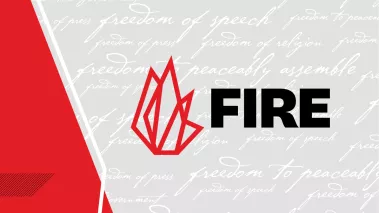Table of Contents
‘Inside Higher Ed’ Covers Valdosta Suit

Inside Higher Ed has a comprehensive article today about Hayden Barnes’s federal lawsuit against Valdosta State University. The article does a good job of capturing the degree of paranoia that was necessary for university officials to seriously entertain the notion that Barnes posed a “clear and present danger”:
As additional evidence of the threat posed by Barnes, the document referred to a link he posted to his Facebook profile whose accompanying graphic read: “Shoot it. Upload it. Get famous. Project Spotlight is searching for the next big thing. Are you it?” It doesn’t mention that Project Spotlight was an online digital video contest and that “shoot” in that context meant “record.” The appeal also mentions that Barnes’s profile stated, at one point, that he was “cleaning out and rearranging his room and thus, his mind, or so he hopes.” That was likely a status update, commonly used by Facebook members to update their friends on what they’re doing at a particular moment — whether literally or metaphorically.
Barnes’s attorney Robert Corn-Revere said it best when he told Inside Higher Ed, “Sometimes there will come along a set of facts where you read it and you think, they couldn’t possibly have done this. Then you look at it [and realize that] yes, they did.”
The comments section following the article also provides some revealing insight into the post-Virginia Tech climate on college campuses and the ongoing threat that climate poses to the First Amendment. One commentator wrote that
The phrase “Memorial Parking Garage” [the phrase that sent Zaccari into a frenzy] would have made me extremely nervous if it had been my name connected to it. Perhaps this young man was off balance not just a student concerned with the physical appearance of his campus and the enviromental impact of new buildings. If VT had attempted to remove the killer when he was just a troubled student would we have had the same stories of lawsuits and how dare they attitude.
Another commentator, while acknowledging that VSU might have gone overboard, stated that “if an institution fails to act, and fails to try to get students evaluations and help, and something happens, then [Inside Higher Ed] and other publications simply switch their headlines to ‘Officials Took No Action, Could Have Prevented Tragedy.’”
Fortunately, some other comments point out the importance of not sacrificing the First Amendment for security concerns:
This story is a perfect example of how post-Virginia Tech (and, for that matter, post-911) fear is eroding citizens’ supposedly constitutionally protected rights. Most universities’ missions include helping students to play more active roles in a participatory democracy, to speak out, to protest inequities and injustices and just plain dumb ideas. Now we’re using (rare) campus tragedies to rid our colleges and universities of students who play those roles, on the pretext that they present a “clear and present danger” to others.
The need to balance safety and freedom is not confined to college campuses; indeed, finding the appropriate balance between order and liberty is a crucial element of setting up any society, and different societies have, over time, chosen different balances (take Singapore, for example). In the United States, that balance is weighed strongly on the side of libertyin our Bill of Rights, which provides Americans with a variety of unassailable freedoms that are consistent with the degree of safety and security that those who founded our country believed appropriate. It is not the place, nor the right, of college administrators to alter that balance.
Recent Articles
FIRE’s award-winning Newsdesk covers the free speech news you need to stay informed.

O holy fight: New Hampshire Satanic Temple statue threatened by more than vandals

California and other states are rushing to regulate AI. This is what they’re missing

One day after FIRE lawsuit, Congress passes changes to filming permits in national parks
